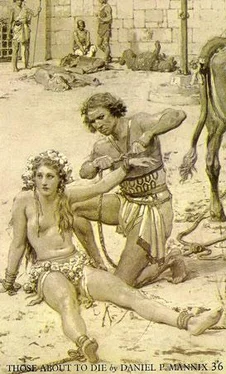Daniel Mannix - Those About to Die
Здесь есть возможность читать онлайн «Daniel Mannix - Those About to Die» весь текст электронной книги совершенно бесплатно (целиком полную версию без сокращений). В некоторых случаях можно слушать аудио, скачать через торрент в формате fb2 и присутствует краткое содержание. Год выпуска: 1972, ISBN: 1972, Издательство: Mayflower Books Ltd, Жанр: Исторические приключения, на английском языке. Описание произведения, (предисловие) а так же отзывы посетителей доступны на портале библиотеки ЛибКат.
- Название:Those About to Die
- Автор:
- Издательство:Mayflower Books Ltd
- Жанр:
- Год:1972
- ISBN:978-0583121347
- Рейтинг книги:4 / 5. Голосов: 1
-
Избранное:Добавить в избранное
- Отзывы:
-
Ваша оценка:
- 80
- 1
- 2
- 3
- 4
- 5
Those About to Die: краткое содержание, описание и аннотация
Предлагаем к чтению аннотацию, описание, краткое содержание или предисловие (зависит от того, что написал сам автор книги «Those About to Die»). Если вы не нашли необходимую информацию о книге — напишите в комментариях, мы постараемся отыскать её.
Those About to Die — читать онлайн бесплатно полную книгу (весь текст) целиком
Ниже представлен текст книги, разбитый по страницам. Система сохранения места последней прочитанной страницы, позволяет с удобством читать онлайн бесплатно книгу «Those About to Die», без необходимости каждый раз заново искать на чём Вы остановились. Поставьте закладку, и сможете в любой момент перейти на страницу, на которой закончили чтение.
Интервал:
Закладка:
Very few of the Christians recanted, although an altar with a fire burning on it was generally kept in the arena for their convenience. All a prisoner had to do was scatter a pinch of incense on the flame and he was given a Certificate of Sacrifice and turned free. It was also carefully explained to him that he was not worshipping the emperor; merely acknowledging the divine character of the emperor as head of the Roman state. Still, almost no Christians availed themselves of the chance to escape. Naturally, there were a few exceptions. Polycarp tells of one man in a provincial amphitheatre who held out until actually in the arena. Then he collapsed and begged to be allowed to sacrifice. The editor refused and demanded that the animals be released. The only animal was a lion who had been starved to make him savage. But the bestiarius had overdone it, and when the lion was released, the poor brute just lay down and died. The martyr had to be burned at the stake.
By the end of the fourth century, the games had fallen into the hands of promoters and the spirit of competition had virtually disappeared. The charioteers had organized a powerful union and now demanded that a man had to be allowed a certain number of wins. A charioteer might race for the Blues in one race and for the Greens in the next. He did not know what horses he would have before he climbed into the chariot—a far cry from Diocles and his perfectly trained teams. The gladiator was finished as a highly trained professional. Obtaining sufficient wild animals for the games had become almost impossible; Europe, north Africa and Asia Minor had been swept bare. The Romans were even running out of Christians, Jews and criminals for the spectacles.
A series of letters left by a senator named Quintus Aurelius Symmachus shows what a problem giving a series of games had become. Symmachus wanted to put on a week's games in honour of his son who had just been made an officer in the swagger Praetorian Guard and would run for praetor in 401 a.d. Symmachus started preparing for the games two years ahead of time.
Symmachus, in addition to being a senator, was a very wealthy man. He owned three palaces and had held nearly every high office in the state. Being a devout man, Symmachus was greatly shocked at the growth of this new cult called Christianity, and he determined to put on some real old-fashioned games to impress the people with scenes of skill and courage in order to disgust them with the namby-pamby doctrines of the new religion. The Master of the Games tried to talk the senator out of putting on anything but the usual run of stuff then current, but Symmachus insisted that he wanted the real thing.
Poor Symmachus ran into nothing but headaches. To get really well-trained chariot horses, Symmachus had to import them from Spain. The nags used in Rome by then were only good enough to go around the track in a fixed race and stage a few smash-ups for the crowd. Eleven out of the sixteen horses Symmachus imported died before they reached the arena from bad handling on the voyage. The four left were so much better than the ordinary chariot horses that the race would have been a walk-away so the team had to be broken up. As a result, their charioteer quit. Four other charioteers were collected and more horses imported. Then it was discovered that the best charioteer was a Christian. As the whole point of the show was to prove that the weak Christians couldn't compete with the manly adherents of the old Roman religion, he had to be fired. But as he was a member of the union; the union called a strike. In a rage, Symmachus threatened to stage a race using dogs instead of horses because, as he said, the regular chariot horses were nothing but dogs anyhow. This caused a riot in which the Prajtorian Guard had to be called out.
Meanwhile, Symmachus was trying hard to get wild animals for the games. He wrote to animal collectors, to friends in distant provinces, to officials, pointing out that they should co-operate in this great crusade to put on some really good shows to restore national morale. He spent months trying to unscramble the red tape. As professional collectors were now scarce, he had to hire his own men. This meant that he had to get them trapping licences, as lions and elephants could only be trapped by special permission of the emperor. He had to get special permission to give the shows in the Colosseum. The customs officials charged him an import tax on the animals although, as Symmachus explained in letter after letter, this tax was meant only to apply to professional dealers who retailed their animals after arrival.
In spite of all this trouble, Symmachus couldn't get any lions, tigers, elephants or even antelope (he wanted topi and impala especially). All that arrived were some "weak and starving bear cubs" and a few crocodiles. The crocs hadn't eaten for fifty days and most of them had to be killed before the shows. Apparently the only animals that arrived in fit condition were some Irish wolf-hounds.
Symmachus had even more trouble getting gladiators. He managed to purchase twenty-nine Saxon prisoners, supposed to be terrific fighters, but the prisoners never got out of gladiatorial school. They strangled each other until there was only one man left—and he beat his brains out against the wall.
What sort of games Symmachus finally put on, I don't know. We only have his correspondence trying to get the acts lined up. We do know that the seven days' games cost him Ј148,000, and I'll bet his son never did get elected praetor.
By the beginning of the fifth century, Rome found herself fighting for her life against the barbarian hordes along her frontiers. With the tremendous cost of the continual wars, it became increasingly difficult to pay for the games. Yet they continued, always catering more and more to the mob. The emperors abandoned the royal box as being undemocratic and sat with the crowd. The patricians made a great point of eating the food thrown to the mob, instead of leaving the amphitheatre for lunch or having slaves serve their own repast.
The chariot races were a joke. People threw wine jars in front of the horses' feet and women encouraged their children to dart under the opposing teams hoping to make their team win. If the child was trampled, the indignant parents sued the racing stables for reckless driving. The crowd still continued to call themselves Blues, Greens, and so on, even though they no longer knew anything about the horses or the men. A somewhat similar trend has occurred in modern big league baseball. Once every man on a team was a local boy; the crowds knew each player individually and turned out to root for friends. Today, the teams are recruited from men all over the country and are sold as commodities without any regard for community feelings. Pliny's remark about the chariot factions would apply today: "The people know only the colour." Yet with no political parties and no feeling of belonging to any specific group, the people centred all their devotion on being a White or a Gold. People who were born Reds swore eternal enmity toward all other factions, supported the Reds under all circumstances, and considered a Green victory a national disaster.
With the economic and military position of the empire too hopelessly complicated for the crowd to comprehend, they turned more and more toward the only thing that they could understand—the arena. The name of a great general or a brilliant statesman meant no more to the Roman mob than the name of a great scientist does to us today. But the average Roman could tell you every detail of the last games, just as today the average man can tell you all about a movie star's marriages but has only the foggiest idea what NATO is doing or what steps are being taken to fight inflation.
Читать дальшеИнтервал:
Закладка:
Похожие книги на «Those About to Die»
Представляем Вашему вниманию похожие книги на «Those About to Die» списком для выбора. Мы отобрали схожую по названию и смыслу литературу в надежде предоставить читателям больше вариантов отыскать новые, интересные, ещё непрочитанные произведения.
Обсуждение, отзывы о книге «Those About to Die» и просто собственные мнения читателей. Оставьте ваши комментарии, напишите, что Вы думаете о произведении, его смысле или главных героях. Укажите что конкретно понравилось, а что нет, и почему Вы так считаете.












